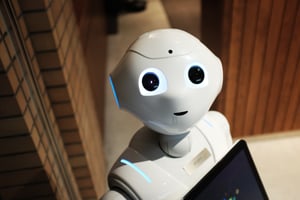How humans and machines have and will work together? It is in the thoughts of many of us. Should we be afraid? Most often we are afraid of those things that we do not know of or we have not yet made sense to ourselves. Artificial intelligence (AI), sometimes called machine intelligence, is intelligence demonstrated by machines, in contrast to the natural intelligence displayed by humans and other animals (Wikipedia). Today the term AI is used quite loosely and easily associated with anything that the machine does on behalf of humans. Even the simplest automation cases are sometimes referred as AI.
Artificial intelligence was coined as a term already in the 1950’s. Since, it was introduced, it has been referred as the mystical fear factor for the human kind which will not only steal all the work, replace the need for human race but also eventually begin the war of machine against machine in which the final result could be the end of the world as we understand it. I’d like to have a more optimistic view to AI and machine learning (ML).
Artificial Intelligence or Machine Learning?
In order to understand the difference and the relation of these terms, we need to first explain how they are defined. Machine learning uses statistical techniques in order to learn with data. Ok, so AI aims to learn from data as well, right? Therefore we can assume that these two are linked to each other. In fact, the “learning theory” is a discipline under artificial intelligence which aims to use machine learning design and algorithms to reach AI. This is why the two terms often collide in conversations. They need each other to exist. 😉
AI -> Learning theory -> ML
Often when we discuss about AI, we actually talk about applications of advanced statistical methods or ML. How can we then define AI? I enjoyed consuming the categorisation of AI by Arend Hintze of Michigan State University. Arenz claims that AI can be defined into 4 categories:
- Reactive or logical; Chess machine can calculate and predict the following moves.
- Limited memory or Experience based; Self-driving car can relate situation with experience and then predict how each object will move in the traffic and how to adapt the cars behaviour and also taking into consideration the traffic rules, and physics and ethics.
- Theory of mind; ML application is more human than the machine. We are not here yet, however, this is the situation in which machines will become social and define their own society or social net of machines.
- Self-aware machine; Not only can the machine react, predict, adapt, be social, but they’ll also have their own will and ability to create new, to be critical and creative and to form a perception of them selves.
We should not be afraid, AI is just another wave of industrial automation. Look at it with opportunistic eyes but don’t be naive.
How did the automation affect the digital marketing industry?
Funny analogy is that the powerpoint reports we used craft and turn into PDF in 2006 and then send to our customers are now most often created by our colleague, the machine. So we recruited this dude called machine whom took over about 2-8 hours per month per customer of billable hours and we don’t see that affecting our billable rate.
How did we replace those hours? New automation technology enabled faster and new ways of reporting and new ways of turning data into stories. New automation technology also enabled new ways of collecting and processing data. The collection of new data and additional data sources needed to be planned, designed and implemented. We found our selves doing more strategic work, and working closer to our customers business requirements.
So, the smarter technology and smarter algorithms enabled automation of fairly large part of our weekly workload, yet we adapted and found new tasks and new definition of our work.
Are we ready for AI and Robot Consultants? Yes we are, if we prepare ourselves.
How the AI and technological development will affect our industry in the coming years?
Most likely many other simple tasks like information discovery, similar to automated anomaly detection and correlation detection which is already automated, will be automated further and we will again adapt our ways of working accordingly.
The data collection systems could become self-aware and learn from previous experiences within similar digital applications and then automatically redesign the data layers and data collection accordingly. In these cases validating and auditing the recommended new setups would require professionals like us. Similarly, the information architectures of digital applications could personalize in almost real-time based on how other apps are performing with the same audience.
The machines can replace traditional media planning work easily. The autonomous digital media campaigns could make new decisions real-time on which audience, media, creative, message and budget to use. Still the machine would need to be trained according to customers business requirements. With programmatic ads we are not too far away from such operating model and the media agencies have adapted to this already.
Cool things will happen!
Connectivity technologies such as 5G together with emerging GPU & display tech will enable new ways to deliver interfaces and again new ways to collect customer data. 5G + IoT/AR/VR means customer touch points will be even further distributed. Attribution will have a more complex meaning. AI/ML bots will handle many of the first interactions as they do already as well as last interactions such as nurturing. Unsupervised applications are still too far from delivering reliable output. These customer facing AI/ML applications will need us humans to train, measure and optimize them.


